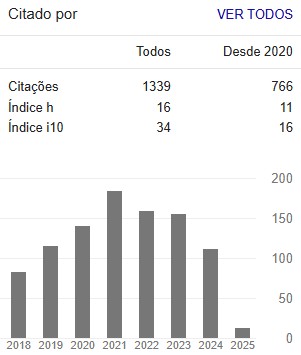Evaluation of respiratory muscle strength and symptoms of dyspnea in the second gestational trimester
Abstract
The purpose of the study was to evaluate respiratory muscle strength and dyspnea symptoms in healthy pregnant women in the second trimester of pregnancy. This is a descriptive study, in which seven pregnant women were forwarded to the University extension project "Physical Therapy in Women that Integrate the Rede Cegônha (SUS)".
An initial evaluation form was applied to collect personal and specific data related to gestation; the Borg scale based on some daily situations of the pregnant woman’s life for the subjective perception of effort and the manovacuometry test.
The research showed that inspiratory and expiratory muscle forces are decreased in the second gestational trimester, also the situation of greater subjective perception of effort was "to clean the house."
We concluded that there is a decrease in respiratory muscle strength and that it may be associated with dyspnea symptoms presented.
Keywords: pregnancy, gestation, dyspnea, respiratory function tests, respiratory muscle strength, respiratory muscles.
Downloads
Downloads
Published
Issue
Section
License
Os artigos submetidos à revista Colloquium Vitae estão licenciados conforme CC BY-NC-ND. Para mais informações sobre essa forma de Licenciamento, consulte: http://creativecommons.org/licenses/by-nc-nd/4.0/.
A disponibilização é gratuita na Internet, para que os usuários possam ler, fazer download, copiar, distribuir, imprimir, pesquisar ou referenciar o texto integral dos documentos, processá-los para indexação, utilizá-los como dados de entrada de programas para softwares, ou usá-los para qualquer outro propósito legal, sem barreira financeira, legal ou técnica.

